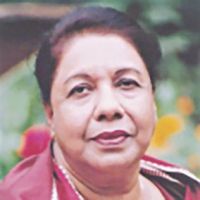Ahmed, Sufia
Ahmed, Sufia (1932-2020) also known as ‘Sufia Ibrahim’ and ‘Bhasakanya’. She was born on 20 November 1932 in Faridpur district. Her father’s name is justice muhammad ibrahim and mother’s is Lutfunnesa Ibrahim. Muhammad Ibrahim was a judge of Dhaka High Court, Vice-Chancellor of Dhaka University and Law Minister of the central government of Pakistan. Sufia Ahmed was brought up in a noble Muslim family in an environment with progressive and humanitarian values. Due to her father’s transferable job, the influence of Bengal’s pluralistic social philosophy was inculcated in her mind from early life.

Sufia Ahmed’s study began at her family. She was first admitted to St. Francis Xavier’s School in Dhaka and later on to ‘Dow Hill School’ in Darjeeling, India. After partition in 1947, her father’s workplace moved to Barisal. She passed matriculation in 1948 and intermediate examination in 1950 with merit. In 1950, she was admitted to Dhaka University in the Department of Islamic History and Culture to pursue her honors degree. In 1953, she obtained her honors and in 1954 obtained postgraduate degree with merit. In 1960, Sufia Ahmed obtained her PhD degree from SOAS under the University of London for the thesis titled ‘Some Aspects of the History of the Muslim Community in Bengal (1884-1912)’. While studying at Dhaka University, she was associated with Salimullah Muslim Hall as a non-resident student. In the academic year 1950-51, she was elected a member of the Muslim Hall Students Union. In 1955, she got married to Barrister syed ishtiaq ahmed. Syed Ishtiaq Ahmed was a senior advocate of the Supreme Court, former Attorney General of the Government of Bangladesh and Advisor to the Caretaker Government in 1996 and 2002.
Sufia Ahmed’s career began on 30 January, 1961, when she joined the Department of Islamic History and Culture of Dhaka University as a lecturer. She was promoted to Senior Lecturer in 1967 and Associate Professor (Reader) in 1973. She was appointed Professor on 2 February 1982. From 1981 to 1984, she served as the Chairperson of the Department. She retired in 1993 after teaching at university of dhaka for a long time. She was appointed National Professor in 1995, being the first woman national professor in Bangladesh.
Sufia Ahmed, a progressive thinker, scholar and historical researcher, has done lifelong research focusing on the Muslim societies of India and Bangladesh. She portrayed the backwardness of the Muslim society of Bengal and charted the course of their development in an academic manner. Her specialization was on Turkish history with a focus on secularism in the light of which she dreamt of Bengali women’s emancipation. During her professional life, four research books and 25 articles authored by her have been published in journals at home and abroad. Her book ‘The Muslim Community in Bengal (1884-1912)’ is included in the syllabi of various universities around the world. ‘Feminism’ was strongly present in her speeches and writings.
Apart from teaching, Sufia Ahmed was actively involved in social service, cultural activities and creative works as an organizer. During the 1952 movement to make Bengali as one of the state languages of Pakistan, she was a second year student of the Department of Islamic History and Culture and an active participant in the language movement. She was one of the violators of Article 144 by defying the government’s ban on the language movement in February 1952. Sufia Ahmed played an important role in raising funds for different programs of the language movement. She tried to mobilize the female students to take part in the movement. She was the founding life member of ‘Bangladesh Itihas Parishad’ and served as its president twice. In recognition of her outstanding contribution to the Bangladesh Itihas Parishad, she was awarded with a gold medal on the Parishad’s Golden Jubilee (2016). At the national level, she served as a member of the Board of Directors of Bangladesh Bank, Senate of Khulna University, Board of Governors of Bangladesh Public Administration Center (CHAN), Bangladesh Film Censor Board and Bangladesh National Women’s Association. In 2009, asiatic society of bangladesh elected her as ‘Fellow’.
Sufia Ahmed travelled to different countries of the world, and contributed at the international level in education, cultural and other fields. In 1952, she represented Pakistan’s cultural team in Turkey, twice in the United Nations General Assembly in 1969 and 1979, and in 1983 in the UNESCO session in Paris. From 1972 to 1986, she was the International Commissioner of 'Bangladesh Girls Guide Association’. Sufia Ahmed served as a visiting professor at Bosphorus University in Turkey in 1984-85 and at Alverno College in the Wisconsin state of USA in 1985. She was awarded ‘Ekushey Padak’ by the Government of the People’s Republic of Bangladesh in 2002 in recognition of her contribution to the language movement and the development of education and culture in Bangladesh. In 2010, Dhaka City Corporation named the road No. 12 of Dhanmondi as ‘Bhasa Sainik Dr. Sufia Ahmed Road’. Her biography was included in the 9th edition of ‘International Dictionary of Distinguished Leadership’ published by American Biographical Institute Inc in 2002.
She died on 9 April, 2020. [Abdul Bashir]
References Dhaka University Record Room, Personal File of Dr. (Mos) Sufia Ahmed, File No: 38, Islamic History, 1992-1993 (General-c), p.21; ওয়াকিল আহমদ ও নাজিমুদ্দিন আহমদ (সম্পা.), ‘জাতীয় অধ্যাপক ড. সুফিয়া আহমেদ এর জীবনবৃত্তান্ত' ইতিহাস, বাংলাদেশ ইতিহাস পরিষদ পত্রিকা, আন্তর্জাতিক মাতৃভাষা দিবস সংখ্যা, ঢাকা, ২০০০, পৃ. ১৫৫; অধ্যাপক ড. সুফিয়া আহমেদ, ইসলামের ইতিহাস ও সংস্কৃতি বিভাগে সংরক্ষিত ব্যক্তিগত ফাইল, ঢাকা বিশ্ববিদ্যালয়, (১৯৬১-২০১৬), পৃ. ৫২।
